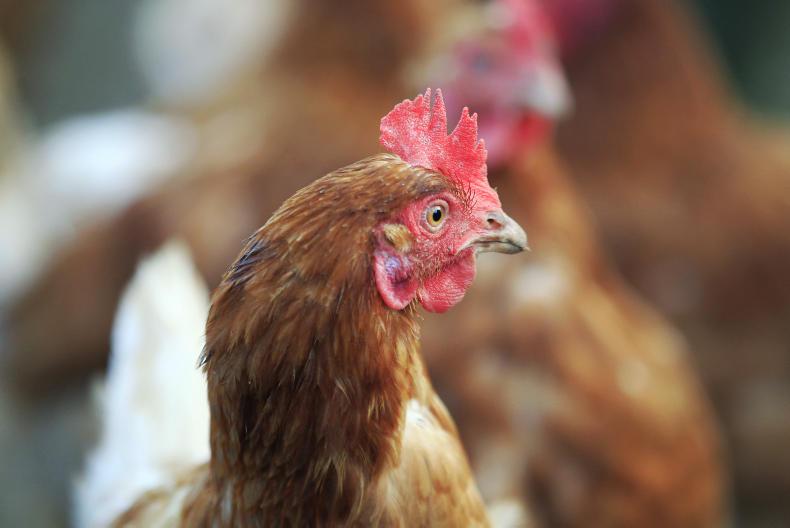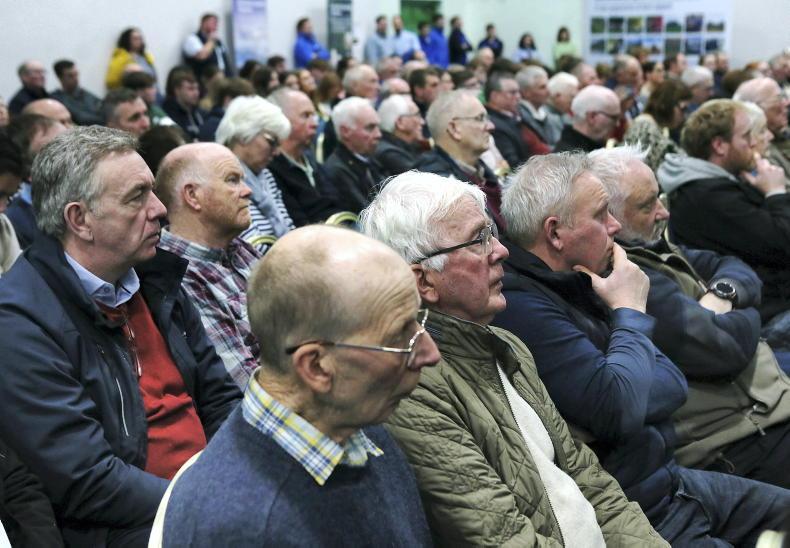The poultry industry in Northern Ireland (NI) is world-class, and the envy of many competitors, but there is no room for complacency, and no room for standards to slip.
Making the argument at a meeting organised by the Ulster Farmers’ Union held at CAFRE Greenmount last week was John Kirkpatrick, the agriculture manager with Tesco, responsible for poultry and eggs.
Originally from Co Antrim, Kirkpatrick described his pride at what the supply base does in his homeland. “We must maintain those standards, and challenge those who do not,” he said.
In a wide-ranging discussion, it was put to Kirkpatrick that it would be unfair to expect farmers here to maintain those standards while at the same time the UK goes off and does trade deals after Brexit, bringing in the likes of cheap, chlorine-washed chicken from the US.
“The customer will decide what is acceptable and what is not. But the average consumer I believe would be horrified at the thought of chlorine-washed chicken. I don’t think we, as a business, would support it,” he responded.
But he also made the point that there are other countries in Asia, south America and Europe that produce chicken to a standard that is every bit as good as the average UK producer.
So farmers have to be realistic about Brexit – removing tariff barriers and doing free-trade deals will inevitably open the UK market to cheaper food imports. Consumers will pay a premium for local product, but within limits, and affordability of food has never been more important.
As a result, the price always trumps other issues such as provenance, production system or animal welfare, but with various animal rights’ groups targeting the sector, the industry must always be alive to bad publicity.
Kirkpatrick highlighted that good progress has been made with reducing campylobacter contamination and lowering antibiotic usage, but suggested more work needs to be done around hock burn and pododermatitis in broiler flocks.
“It is an area we could get challenged on, and an area where we are exposed,” he said.
He presented figures showing that rates of both diseases are higher in UK flocks than elsewhere. Figures for hock burn put the average in UK flocks at 19.5%, compared to 7.9% in the EU and 4.2% in the rest of the world. On pododermatitis, the UK average is 35.2%, compared to 21.4% in the EU and 20.7% in the rest of the world.
Cage free
Kirkpatrick was also challenged on the decision by Tesco, and other UK retailers, to go cage-free on eggs by 2025.
That came in response to a petition campaign in 2016 led by a 14-year-old girl from Sheffield, Lucy Gavaghan. Given that producers across the UK had just spent over £400m converting from conventional to enriched colony cages in 2012, the decision caused a lot of anger among producers at the time.
However, similar moves to cage-free egg production are also happening in the US and in Europe, and according to Kirkpatrick, it is simply driven by consumers who don’t want to buy eggs from hens kept in cages.
Despite that, he pointed out that it is not a ban on enriched cages, and there will still be an outlet in processing and foodservice.
So what will replace caged egg on the value shelf? “For us, the value tier will be barn egg,” said Kirkpatrick.
When asked if free range eggs could end up as the value offering, he responded: “I hope not, or all consumers will just go to the bottom of the shelf.”
He estimated that around 1m birds in the Tesco supply base have already converted from caged into barn systems. To convert to the standard desired by Tesco costs up to £15 to £16 per bird, so it is a significant investment, but still less than building a barn system from scratch. He believes that barn egg can only work financially if the house is already in place.
Expansion
Kirkpatrick also left his audience at Greenmount in no doubt that future expansion in the egg and poultry sector must be carefully planned. In particular, in NI over the last couple of years there has been major expansion in egg production, some of which is eggs that are shipped to Britain for packing. The UK egg market is currently well supplied and producer returns are under pressure.
“The level of growth in egg in NI is not sustainable. Also, in England and Scotland, there has been an explosion of chicken – planners are saying ‘No more’. Think really hard before you invest. Make sure you scrutinise contracts on offer and make sure they are watertight,” he said.
Read more
Farmer Writes: egg producers facing a price squeeze
Farmer Writes: rearing a politically correct pullet
The poultry industry in Northern Ireland (NI) is world-class, and the envy of many competitors, but there is no room for complacency, and no room for standards to slip.
Making the argument at a meeting organised by the Ulster Farmers’ Union held at CAFRE Greenmount last week was John Kirkpatrick, the agriculture manager with Tesco, responsible for poultry and eggs.
Originally from Co Antrim, Kirkpatrick described his pride at what the supply base does in his homeland. “We must maintain those standards, and challenge those who do not,” he said.
In a wide-ranging discussion, it was put to Kirkpatrick that it would be unfair to expect farmers here to maintain those standards while at the same time the UK goes off and does trade deals after Brexit, bringing in the likes of cheap, chlorine-washed chicken from the US.
“The customer will decide what is acceptable and what is not. But the average consumer I believe would be horrified at the thought of chlorine-washed chicken. I don’t think we, as a business, would support it,” he responded.
But he also made the point that there are other countries in Asia, south America and Europe that produce chicken to a standard that is every bit as good as the average UK producer.
So farmers have to be realistic about Brexit – removing tariff barriers and doing free-trade deals will inevitably open the UK market to cheaper food imports. Consumers will pay a premium for local product, but within limits, and affordability of food has never been more important.
As a result, the price always trumps other issues such as provenance, production system or animal welfare, but with various animal rights’ groups targeting the sector, the industry must always be alive to bad publicity.
Kirkpatrick highlighted that good progress has been made with reducing campylobacter contamination and lowering antibiotic usage, but suggested more work needs to be done around hock burn and pododermatitis in broiler flocks.
“It is an area we could get challenged on, and an area where we are exposed,” he said.
He presented figures showing that rates of both diseases are higher in UK flocks than elsewhere. Figures for hock burn put the average in UK flocks at 19.5%, compared to 7.9% in the EU and 4.2% in the rest of the world. On pododermatitis, the UK average is 35.2%, compared to 21.4% in the EU and 20.7% in the rest of the world.
Cage free
Kirkpatrick was also challenged on the decision by Tesco, and other UK retailers, to go cage-free on eggs by 2025.
That came in response to a petition campaign in 2016 led by a 14-year-old girl from Sheffield, Lucy Gavaghan. Given that producers across the UK had just spent over £400m converting from conventional to enriched colony cages in 2012, the decision caused a lot of anger among producers at the time.
However, similar moves to cage-free egg production are also happening in the US and in Europe, and according to Kirkpatrick, it is simply driven by consumers who don’t want to buy eggs from hens kept in cages.
Despite that, he pointed out that it is not a ban on enriched cages, and there will still be an outlet in processing and foodservice.
So what will replace caged egg on the value shelf? “For us, the value tier will be barn egg,” said Kirkpatrick.
When asked if free range eggs could end up as the value offering, he responded: “I hope not, or all consumers will just go to the bottom of the shelf.”
He estimated that around 1m birds in the Tesco supply base have already converted from caged into barn systems. To convert to the standard desired by Tesco costs up to £15 to £16 per bird, so it is a significant investment, but still less than building a barn system from scratch. He believes that barn egg can only work financially if the house is already in place.
Expansion
Kirkpatrick also left his audience at Greenmount in no doubt that future expansion in the egg and poultry sector must be carefully planned. In particular, in NI over the last couple of years there has been major expansion in egg production, some of which is eggs that are shipped to Britain for packing. The UK egg market is currently well supplied and producer returns are under pressure.
“The level of growth in egg in NI is not sustainable. Also, in England and Scotland, there has been an explosion of chicken – planners are saying ‘No more’. Think really hard before you invest. Make sure you scrutinise contracts on offer and make sure they are watertight,” he said.
Read more
Farmer Writes: egg producers facing a price squeeze
Farmer Writes: rearing a politically correct pullet










SHARING OPTIONS